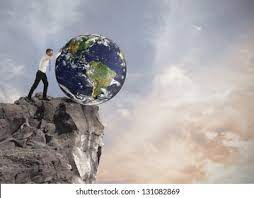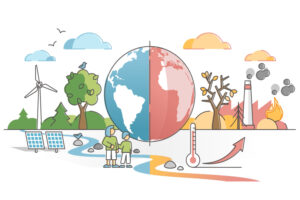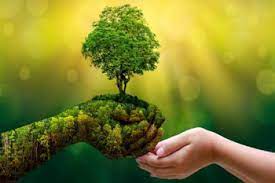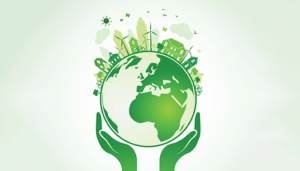by chandiniann | Aug 29, 2023 | Interesting Reads

In a world where human influence seems boundless, the question arises: Why are we provoking nature? The very force that nurtures and sustains us, why do we, at times, incite its fury? Delving into this complex interplay between mankind and the environment reveals a web of motives, actions, and consequences that demand introspection.
1. The Pursuit of “Progress”
In the quest for progress and innovation, humans have embarked on a relentless journey of pushing boundaries. From urbanization to industrialization, our pursuit of advancement often comes at the cost of nature’s equilibrium. The allure of technological marvels can inadvertently lead us to provoke nature’s delicate balance.
2. The Illusion of Control
The desire for control over the natural world fuels attempts to tame it. Whether altering landscapes or diverting waterways, humans sometimes succumb to the illusion that we can master nature’s forces. Yet, these endeavors can backfire, reminding us of our limits in shaping a world that predates our existence.
3. Economic Exploitation
The economic engine often drives the relentless exploitation of natural resources. Mining, deforestation, and excessive extraction erode the very foundation of ecosystems. The pursuit of short-term economic gains can blind us to the long-term consequences, jeopardizing not only the environment but also our future.
4. Ignorance and Neglect
In our haste, we sometimes overlook or dismiss the consequences of our actions. Ignorance or negligence towards the intricate interconnections within ecosystems can lead to unintended outcomes. An action in one corner of the world can trigger a cascade of effects far beyond our initial intentions.
5. Disconnected from Nature
As urbanization and technology advance, we risk growing disconnected from nature’s rhythms. This detachment can inadvertently lead to a lack of understanding and empathy towards our environment. Provoking nature might stem from this detachment, driven by an unconsciousness of its fragility.
6. Seeking Harmony
Amidst the unfolding challenges, a growing consciousness beckons us to reimagine our relationship with nature. From sustainable practices to conservation efforts, there’s a collective awakening, or #greenempathy, that seeks to harmonize our actions with the environment rather than provoke it.
In this intricate dance between humanity and nature, introspection becomes a necessity, possible through the learning and practice of #emotionalintelligence. Understanding why we provoke nature compels us to reassess our priorities, rethink our impact, and foster a harmonious coexistence that preserves the planet’s beauty and vitality for generations to come.

Business man standing between climate worsened with good atmosphere
by chandiniann | Aug 23, 2023 | Interesting Reads

In a world where the environment’s fragility echoes louder each day, an unexpected ally arises – Emotional Intelligence (EI). Beyond its role in interpersonal dynamics, EI has a profound influence on the realm of environmental economics, forging an intricate link that holds the potential to reshape our approach to sustainability.
Emotional Intelligence: A Bridge to Sustainable Actions
Emotional Intelligence, the ability to recognize, understand, and manage emotions in oneself and others, might seem distant from environmental concerns at first glance. However, a closer look reveals its role as a crucial bridge between human behaviors and the environment. Individuals with high EI exhibit a greater propensity for empathy, self-awareness, and social awareness. This heightened emotional awareness extends beyond human interactions to encompass the world around us – including nature.
Empathy Towards Nature: A Catalyst for Sustainable Choices
Empathy, a cornerstone of EI, extends its reach beyond human relationships. As we cultivate empathy towards nature, we develop a deeper connection with the environment. This connection prompts us to consider the consequences of our actions on the planet. High EI individuals are more likely to comprehend the long-term impact of their choices, inspiring sustainable behaviors that ripple through environmental economics.
EI’s Impact on Decision-Making in Environmental Economics
Environmental economics delves into how our economic activities intertwine with the environment, exposing the impact of our choices. It unveils the costs and gains of our actions on nature, steering us toward informed decisions that bolster both our economy and the planet’s well-being. Emotional Intelligence profoundly shapes environmental economics, empowering decision-makers with EI to navigate ethical complexities. Armed with the capacity to balance short-term gains and long-term effects, they drive judicious, sustainable choices.
Collaboration for a Sustainable Future
High EI fosters effective communication and collaboration – essential tools in the realm of environmental economics. Complex challenges like climate change demand collaborative efforts between governments, businesses, and communities. Emotional Intelligence enhances the ability to build bridges of understanding, facilitate dialogue, and find common ground in crafting sustainable solutions.
EI in Corporate Sustainability Practices
In the corporate landscape, businesses are increasingly acknowledging the importance of environmental sustainability. Emotional Intelligence plays a pivotal role in driving this shift. Leaders with high EI are more attuned to stakeholder needs and environmental concerns. This empathy-driven approach encourages sustainable practices that align with broader ecological goals.
A Holistic Approach to Sustainability
The nexus between Emotional Intelligence and environmental economics underscores the significance of a holistic approach to sustainability. It transcends technology and economics to spotlight human consciousness. Empathy, responsible choices, and collaboration carve a path where economic growth and environmental care blend seamlessly.
Amidst pressing environmental issues, Emotional Intelligence quietly emerges as a potent force shaping our planet’s protection. Environmental economics and Emotional Intelligence (EI) enhance bottom lines by promoting sustainable practices and empathetic leadership. Businesses adopting eco-friendly processes reduce costs and attract conscious consumers. EI-driven leaders improve employee engagement, innovation, and problem-solving, boosting productivity. Ethical practices enhance brand reputation, loyalty, and sales. This fusion of environmental responsibility and EI generates profitability and sustainable growth. Are you there yet? Connect with me at chandini.khanna@gmail.com
by chandiniann | Aug 22, 2023 | Interesting Reads

Image Courtesy: e-ir.info
In our race toward progress, a daunting truth looms. Beneath the glittering façade of unchecked development lies impending disaster. The antidote? Environmental Economics. Before leaping into the abyss of unbridled growth, we must confront the reality: safeguarding our planet requires not mere contemplation, but an unyielding commitment to the principles of environmental economics.
Unmasking Devastation
Masked by short-term gains, we’re sacrificing the essence of life – our environment. Unrestrained urbanization, resource exploitation, and pollution forewarn a calamitous future.
Echoes of Value
Environmental economics is no abstract concept; it echoes with the Earth’s silent cries. It quantifies nature’s value beyond figures, revealing the cost of degradation and the priceless worth of untouched ecosystems.
Hidden Debt
Unfettered development extracts a heavy toll. Vanishing biodiversity, poisoned air, depleting water sources – these are debts passed on to future generations. Environmental economics unveils these concealed dues, a stark reminder of today’s actions shaping tomorrow’s fate.
Empowerment in Balance
Environmental economics isn’t about conceding defeat; it’s seizing control. It steers growth towards sustainability, honoring nature’s balance while fostering progress. It recognizes resources as finite, demanding every stride to be in harmony with the environment.
Pause for Thought
Before the next project commences, a moment of reflection is due. Are we crafting a legacy of prosperity or of ruin? Environmental economics compels this inquiry. It insists on every plan being infused with a deep grasp of our environment, not just economic equations.
Redemption Awaits
Environmental economics is our redemption, a lifeline away from the brink. It mandates policies nurturing both the economy and ecology. It challenges us to rise above the allure of instant gains, acknowledging that our planet’s future hinges on its ecosystems’ health.
Urgent Call
Time is short, and reckoning is imminent. Blind development has brought us to the precipice; the time for change is now. Environmental economics isn’t a choice but an obligation. It’s a counterbalance to reckless expansion, a testament to our commitment to the Earth’s sustenance.
Before foundations are laid, before resources are exhausted, let’s remember – our legacy transcends structures. Environmental economics isn’t a privilege; it’s a duty to our planet and those who will inherit it. The question isn’t if we can afford it; it’s if we can afford to disregard it.
by chandiniann | Aug 22, 2023 | Interesting Reads

In a world rife with challenges stemming from environmental degradation, an unexpected champion emerges on the horizon of sustainability: high emotional intelligence (EI). While this might seem like a surprising connection, delving deeper reveals the profound influence EI holds in safeguarding the delicate balance of our natural world.
Nature’s Resilience and Emotional Intelligence
Understanding the delicate balance in nature exposes us to the intricate harmony present in ecosystems. This exposure prompts us to reflect on the interconnectedness and interdependence that nature exemplifies. As we internalize these principles, we become more attuned to our own emotions and those of others, fostering heightened self-awareness and empathy.
This sensitivity helps us understand relationships better, boosting both personal and collective emotional intelligence.
The Hidden Connection: Empathy and Sustainability
Empathy, the cornerstone of EI, is a quality that resonates through nature’s diverse landscapes. From the intricate interactions between predator and prey to the interdependent relationships between plants and pollinators, nature thrives in an empathetic ecosystem where each element recognizes the vital role of the other. Likewise, high emotional intelligence fosters a profound ability to empathize – to sense and understand the emotions of others. This empathy fuels a collective drive for well-being, resonating with the very essence of nature’s intricate balance.
Nature’s Wisdom in Emotions
Nature’s interconnectedness reverberates with emotional intelligence on a tangible level. A change in one facet of nature’s delicate web can trigger a ripple effect that touches every corner of the ecosystem. This mirrors the emotional interconnectedness fostered by EI. The emotional state of one individual can cascade through social networks, affecting the well-being of a community. Recognizing this interconnected harmony propels us toward greater emotional awareness and the conscious management of our collective impact.
Nature and Emotional Intelligence
Nature’s sustainability is not about short-term gains but enduring legacies. The same principle of foresight resonates within the realm of emotional intelligence. Nature’s ecosystems understand the long-term consequences of actions and adapt accordingly, aiming for sustainability over generations. Similarly, individuals with high emotional intelligence possess the foresight to anticipate emotional reactions and grasp the far-reaching implications of their words and deeds.
Preservation Through Mindfulness
Nature teaches us the value of living in the present moment while nurturing a future legacy. This mindfulness in nature parallels the mindfulness cultivated through emotional intelligence. Mindful individuals approach situations with clarity, untainted by biases, and find effective solutions through this focused lens.
Balanced Emotions, Sustainable World
The bridge between high emotional intelligence and nature’s sustainability is a symbiotic one. By embracing nature’s equilibrium, we unlock deeper self-awareness and empathy. This helps us manage complicated relationships, solve problems as a team, and build a balanced world where our emotions and taking care of the environment go hand in hand.
As we stand at the crossroads of environmental dilemmas and the complexities of human connections, acknowledging the parallel journey of high emotional intelligence and nature’s sustainability is pivotal. By cultivating emotional intelligence within us and promoting sustainable choices in our communities, we assume the role of guardians for a world where empathy and balance prevail. This commitment would ensure a lasting legacy of harmony for future generations. Let’s learn Emotional Intelligence! – connect with me at chandini.khanna@gmail.com

by chandiniann | Aug 14, 2023 | Interesting Reads

Imagine a buzzing coffee shop, where the smell of freshly brewed beverage mingles with the clatter of keyboards and incessant phone conversations. In this bustling scene, a distinct group emerges – the ‘Oh I Am So Busy’ troupe. Armed with planners and smartphones, they embark on a quest to convince the world of their busyness, rivaling the urgency of a Mumbai local train during peak hours.
With a mischievous glint in their eyes, they spin tales of meetings that stretch like never-ending Bollywood sagas, deadlines that chase them like street dogs, and multitasking that would put a street food vendor to shame. It’s almost as if their entire existence hinges on the perpetual pressure of ‘paapad belna hai.’
But their pièce de résistance lies in their ability to transform routine tasks into gripping narratives fit for a blockbuster. Sending an email becomes an adrenaline-pumping escapade, navigating through the perilous jungles of unread messages. Grocery shopping morphs into a survival mission, an epic battle against ravenous hunger pangs.
And just when you think the act couldn’t get any better, they nonchalantly drop the vacation bomb – “Oh, I’m just taking a quick break in Goa to recharge.” Goa? Recharge? Sounds more like a stealthy undercover operation to uncover the mysteries of ‘busyness’ in a tranquil beach setting.
Time bends and twists in their hands, accommodating more tasks in a day than a street magician fitting rabbits into a hat. If you dare question this time-bending mastery, they’ll graciously bestow upon you the timeless wisdom of “Time management, my friend!”
So here’s to the connoisseurs of the ‘Oh I Am So Busy’ spectacle, those fearless performers who turn the mundane into a gripping play and the every day into a high-stakes performance. As they waltz through the labyrinth of busyness, we can only marvel at their ingenuity and perhaps ponder if they’ve unlocked the elusive secret of fitting 30 hours into a 24-hour day. It might involve a dash of ‘jugaad’ and a sprinkle of ‘magic powder.’ Cheers to the theatrics, my friend!
As the ‘Oh I Am So Busy’ virtuosos put on their show, they might be too absorbed in their inbox orchestra to hear the symphony of family laughter or to notice the delightful dance of a leisurely stroll. While they conquer their email dragons, the treasure trove of health, happiness, and relationships might be left undiscovered. In the whirlwind of this grand performance, life’s finer details often slip through our fingers. So, consider this a nudge – a timeout from the frenzy – to catch those fleeting moments before they disappear in the pursuit of the spotlight. Remember, the most riveting scenes aren’t scripted; they’re the unscripted connections with the world and the whispers of our own humanity.









